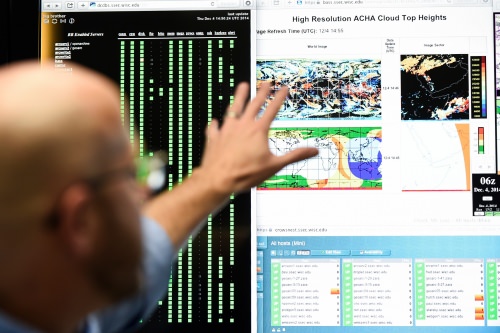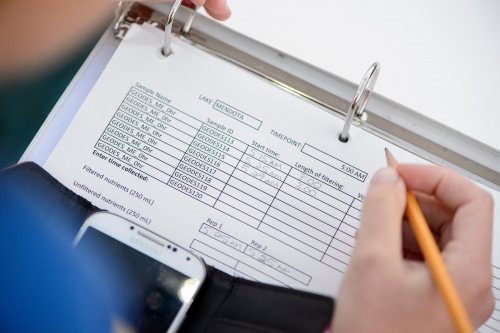UW-Madison launches data science initiative
Every day, each of us generates an incredible volume of data. The ability to apply analytics to extract powerful insights from these data has a tremendous influence on our lives. Data researchers at UW–Madison are key contributors in creating new methodologies in research to develop real-world applications in disciplines as diverse as computer science, health, education, law, business, the humanities and policy.
Today, the Office of the Vice Chancellor for Research and Graduate Education announces an initiative to support two-year grants for data sciences research. The initiative is backed by at least $1 million in funding.

Jerrold Robaidek describes satellite weather imagery displayed on computer monitors at the Space Science and Engineering Center (SSEC) Data Center on the UW–Madison campus. Photo: Jeff Miller
More information and the online application form will be available at research.wisc.edu on Nov. 1, 2017, and the deadline to apply will be March 15, 2018.
“UW-Madison’s Data Science Initiative was formed to stimulate development of new research relevant to data science, including new tools for applying data to complex problems,” says Marsha Mailick, vice chancellor for research and graduate education. “In addition, by providing seed funding for data science projects at UW–Madison, we hope to position our faculty to be more competitive when applying for federal and other extramural funding for their research.”
Steve Ackerman, associate vice chancellor for research in the physical sciences, says this is the right time for a data science initiative at UW–Madison.
“The pace of change in the data science field is extremely rapid, and we think the data science initiative is one very good way to keep UW–Madison research on pace with those changes,” Ackerman says. “We’re looking forward to seeing how this initiative can help UW–Madison leverage its knowledge in statistical methodology and computer science to create impactful predictions and insights for a wide range of traditional scholarly fields. Data science is now widely accepted as the fourth mode of scientific discovery, on par with theory, experimentation and computational analysis.”

A graduate student studying water resources engineering and science records data for water samples taken from Lake Mendota. Photo: Jeff Miller
UW-Madison researchers are invited to submit proposals that can cover multiple aspects of data science. Applicants can be single or collaborative investigators. New avenues of research are encouraged. Examples of projects in each area include, but are not limited to:
- The development or application of new methods for analyzing highly complex data.
- The development or application of new analysis techniques using machine learning and data mining to problems that involve large data sets.
- The development or application of new approaches using algorithms and visualization techniques for extracting information from large data sets.
- The development or application of data management and storage systems.
- A collaboration between faculty engaged in curating and making large data sets useful and available to the broader research community for further analysis.
- A collaboration where expertise in computer software or hardware is made available to researchers needing that expertise.
A faculty committee of subject matter experts will review the proposals to identify those that hold the most promise for sustained research programs and galvanizing research funding. The committee will then make recommendations to the Office of the Vice Chancellor for Research and Graduate Education. The OVCRGE will make final selections.
Research grants will be available in two categories: projects less than $100,000, and those more than $100,000 up to a maximum of $250,000.
The Wisconsin Alumni Research Foundation, through the Office of the Vice Chancellor, is providing the funding for the UW–Madison Data Science Initiative.
Tags: data, grants, research, Vice Chancellor for Research




